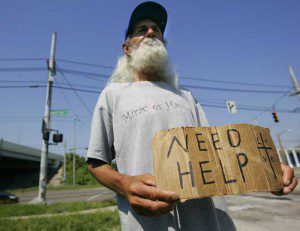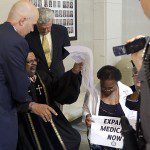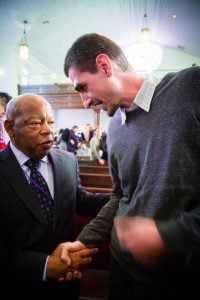 On Ash Wednesday, I wrote about how Rutba House, along with friends from around Durham, has chosen to focus our Lenten fast on a recent ordinance that makes it illegal to beg on our streets.
On Ash Wednesday, I wrote about how Rutba House, along with friends from around Durham, has chosen to focus our Lenten fast on a recent ordinance that makes it illegal to beg on our streets.
Our commitment has been 1) to raise awareness through personal conversation and correspondence about the difficulties this creates for our most vulnerable neighbors and 2) to stand with those neighbors in any way we can.
Last Monday, this second commitment took us to court. Cherokee was the first person cited for violating Durham’s new ordinance. He was charged with standing on a median at a major intersection, as he has for years, holding a sign that said, “Will work.”
The income that Cherokee earns from the occasional side job he solicits in this manner is his primary source of income. He has developed good relationships over the years both with a clientele that knows where to find him and with police officers who know he presents no danger to the public. The officer that came to give him a ticket, Cherokee told us, wasn’t a regular on that beat. But he was just doing his job.
Just like the assistant district attorney in court last Monday was doing his job. He’s a good man who is supposed to represent the public interest, but he couldn’t see fining someone who was begging to make ends meet. He worked out a deal with Cherokee’s lawyer, a friend who graciously offered to represent Cherokee for free. If Cherokee pled guilty, he could walk out with all fines and court fees waived.
Cherokee told us, “I know I’m the first one out here who’s gotten one of these. I know there’s a lot more coming. I just want to help any way I can.” But the legal system is long and complicated, especially for someone who doesn’t have their own transportation or consistent income. His lawyer encouraged him to take the plea.
“So what do I do the next time I get one of these,” Cherokee asked?
“You call me,” his lawyer said. “I’ll be here for you.”
I was glad to get to stand alongside three ordained clergy from Durham as the judge told Cherokee he was free to go. It was good to see that, despite a bad law, the courts can have mercy.
That was Monday.
But none of us were on the street on Friday, when a man we didn’t know from the local homeless shelter was arrested for violating the same ordinance. He spent the weekend in jail for doing what Cherokee had done–standing on the side of the road, holding a sign and asking for help.
We have had several good exchanges with our City Council, in which they assure us that they’re looking into these matters and considering them carefully. I want to believe them. However, we have also learned from homelessness service providers, as well as from members of the advisory board that exists to consult with city and county officials on these matters, that none of them were asked to weigh in on this ordinance.
It was never up for public discussion.
So we have decided to host a public meeting on Durham’s panhandling ordinance to hear from the people who are being most impacted by it. We think folks like Cherokee deserve to be heard.
So we need help getting this word out.
Durham’s First Public Meeting on Ordinance #14375
7-8pm, Thursday, March 21st
Duke Memorial United Methodist Church (504 W Chapel Hill St)
We’ll only meet for an hour, but we need to pack the hall to help our elected officials see that this is not a marginal issue, but something that matters for everyone in Durham.
So please come. Please bring your friends. Please help us say loud and clear to our friends who’ve been forced to beg, “We want you. We need you. You don’t belong in jail. We need to learn from you and with you how we can care for one another.”











